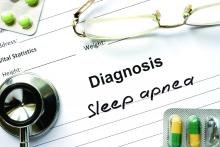Adults with obstructive sleep apnea are approximately twice as likely as are those without it to develop gout, according to data from a large, retrospective study with a median 5-year follow-up.
Data from previous studies have shown an increased risk in developing gout within the first year of an obstructive sleep apnea (OSA) diagnosis, wrote Milica Blagojevic-Bucknall, PhD, of Keele (England) University, and her colleagues.
In a study published in Arthritis & Rheumatology, the researchers compared 15,879 patients with OSA and 63,296 without.
Overall, 4.9% of OSA patients and 2.6% non‐OSA controls developed gout over a median follow‐up period of 5.8 years. The incidence rate for gout per 1,000 person‐years was 7.83 among patients with OSA and 4.03 for controls (adjusted hazard ratio, 1.42). The greatest risk for gout in the OSA patients occurred approximately 1-2 years after their diagnosis.
The researchers also found significant associations between body mass index and gout risk in sleep apnea across all BMI categories, but the strongest association occurred in the normal BMI group (HR 2.02) at 2-5 years after the index date of OSA.
“The novelty of this study lies in assessing both the short- and long-term association of OSA with incident gout in a large primary care-based population,” the researchers said. They proposed that the most likely explanation for the events was that “intermittent hypoxia increases nucleotide turnover which enhances endogenous uric acid production.”
The study findings were limited by several factors including potential misclassification of OSA and the impact of confounding variables such as genetics and diet, they noted.
However, the results support the association between sleep apnea and gout, but also serve to highlight that clinicians should “consider the possibility of gout in patients with sleep apnea regardless of obesity,” the researchers wrote.
The National Institute for Health Research funded the study. The authors have no conflicts of interest to declare.
SOURCE: Blagojevic-Bucknall M et al. Arthritis Rheumatol. 2018 Aug 30. doi: 10.1002/art.40662.

